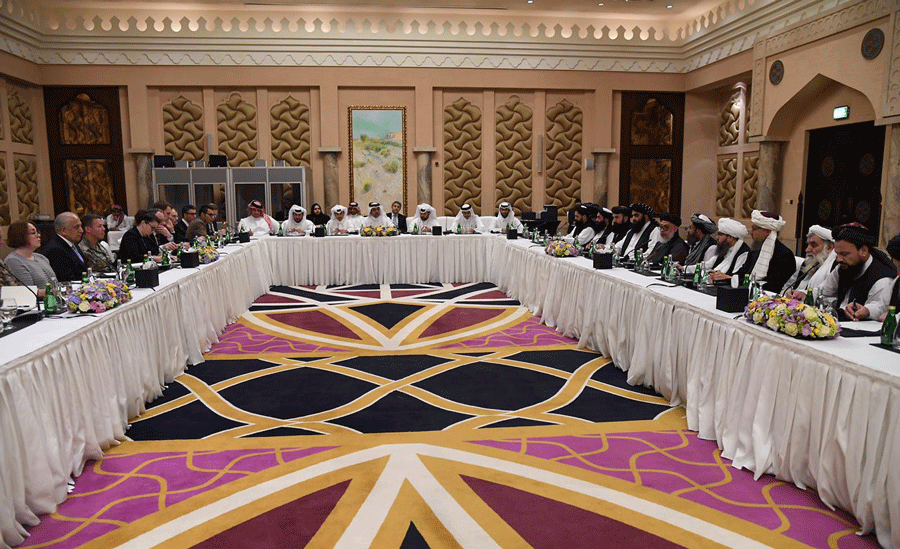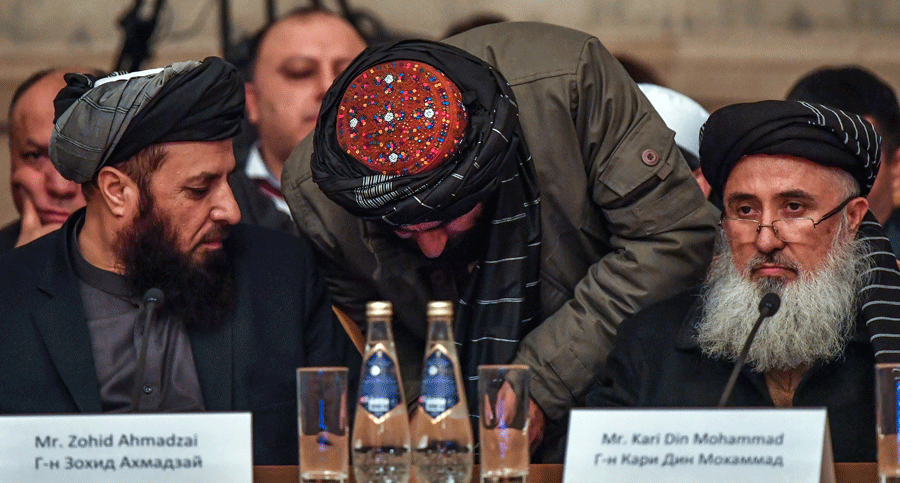Breaking Bread and Ice
By Rahimullah Yusufzai | Newsbeat International | Published 6 years ago

Slow, but steady: US delegates (left), Qatari officials (centre) and the Taliban (right) at a meeting in Doha in February 2019.
The latest round of peace talks between the Afghan Taliban and the US began in Doha, Qatar, on February 25, amid high hopes. This round is important because the newly appointed Deputy Leader of the Taliban, Mullah Abdul Ghani Baradar has, for the first time, joined the talks as the head of his negotiating team. As he was also recently appointed the head of the Qatar-based Taliban Political Commission, his participation in the negotiations with the US has empowered and raised the level of Taliban participation in the talks.
In fact, the US was keen that Baradar and other high-ranking Taliban figures get involved in the peace talks because it felt that the Taliban negotiators were not sufficiently empowered. As US envoy for Afghan reconciliation and head of the American negotiating team, Zalmay Khalilzad conceded that the US had asked Pakistan to release Baradar and allow him to travel to Qatar to join the talks. It is no secret that in early 2010, Pakistan had apprehended Baradar in Karachi in a joint operation with the US authorities. It is obvious that Baradar was arrested and released by Pakistan at the request of the US.
After being flown in on a special plane sent to Pakistan by the government of Qatar, Baradar attended the opening session of the talks on February 25, to introduce his 14-member negotiating team and highlight the need for a peaceful, negotiated settlement of the long-running Afghan conflict. Khalilzad later tweeted that he met Baradar over lunch in Doha. Breaking bread together is important as it allows all sides to break the ice and talk informally about complex issues.
The Doha talks are also important as these took place after the cancellation of the proposed meeting between the Taliban and the US officials in Pakistan. The Taliban abruptly announced the cancellation of the Islamabad visit of the group’s negotiators on February 18. They claimed the Pakistan visit was cancelled due to travel restrictions on some members of the Taliban negotiating team, whose names were mentioned in the ‘black-list’ of the UN Security Council.
It is another matter that sanctioned Taliban members have travelled overseas in the past, most recently to Russia in January to attend the Moscow meeting with Afghan opposition leaders and to Qatar and the United Arab Emirates (UAE) for peace talks with the US. They were enabled to travel by one or the other UN Security Council member by giving them a waiver from the sanctions. This could also have been done in the case of the sanctioned Taliban members intending to travel to Pakistan to hold talks with Khalilzad and his team.
There were reports that senior Taliban leaders had differences over holding peace talks with the US in Pakistan and meeting with Prime Minister Imran Khan. A strong Taliban faction led by hawkish elements controlling its military operations opposed the idea, as it could have reinforced the perception that the Taliban were controlled by Pakistan. For years, the Taliban have been trying to present the image of an independent Islamic group fighting for the glory of Islam and the freedom of their homeland from foreign occupation. To be seen as Pakistan’s proxy could certainly damage the group’s reputation in the eyes of the Afghan people.
Surprisingly, the US government said it had not received an official invitation from Pakistan for the proposed talks with the Taliban in Islamabad. Federal Information Minister Fawad Chaudhry had confirmed the Taliban delegation’s visit to Islamabad for talks with US officials and even termed it a ‘game-changer’ as it afforded a chance for stability in Afghanistan.
Earlier, on February 13, while announcing the Taliban delegation’s visit to Pakistan, their spokesman had also announced that it would have a meeting with Prime Minister Khan. Both, the timing of the proposed Taliban-US talks in Islamabad a week before their already confirmed Qatar meeting on February 25, and the Taliban delegation’s likely meeting with Pakistan’s prime minister, came as a surprise. Questions were asked, mostly in Kabul, whether Pakistan wanted to further oblige the US by hosting the talks in Islamabad and pressurising the Taliban to agree to a ceasefire and hold direct talks with the Afghan government.
While Pakistan has been playing the role of a facilitator by staying in the background, it has yet to host the peace talks on its soil. In fact, Qatar has come to play a more prominent role in facilitating and hosting the Taliban-US talks.
Despite the fact that the Taliban delegation did not visit Pakistan, the prime minister’s critics got an opportunity to lash out at him for agreeing to meet the Taliban negotiators. They reminded him about his sympathies for the Taliban in the past that had earned him the title of ‘Taliban Khan’ after he had offered to open an office for the Tehreek-e-Taliban Pakistan (TTP) to facilitate peace talks with the Pakistan government. He was also chided for justifying the Afghan Taliban’s resistance against the US-led foreign forces in Afghanistan. If the Taliban delegation had visited Pakistan and met with Khan, it would have been the first meeting between a Pakistani prime minister and the Taliban after the fall of the latter’s regime in Afghanistan in 2001. This would have renewed the debate about the kind of relations between Pakistan and the Taliban and the benefits the two are seeking to obtain from the relationship.
As for the ongoing talks in Doha, the two sides met for three days and then took a two-day break. A senior Taliban negotiator, Mulla Khairullah Khairkhwa, said in a video message on February 27 that the break would allow the Taliban and the US negotiators to hold consultations and get guidelines from their leadership before meeting again. Khairkhwa, who was interior minister and governor of Herat province during the Taliban rule, said the talks were moving in the right direction.
Khalilzad, whose tweets are being followed as closely as those of Donald Trump, tweeted that slow and steady steps were being taken in productive talks towards understanding and eventually peace. He listed four issues that were being discussed, including the pullout of foreign forces from Afghanistan, the Taliban’s association with other militant groups and their use of Afghan soil for launching attacks against other countries, the prospects of peace talks between the Taliban and the Afghan government and an agreement on a ceasefire.
After the six-day talks in Doha, both sides reported that a broad understanding had been reached on the first two points and a draft framework was under preparation to materialise an agreement. The timeline of the US-led troops’ withdrawal is under discussion, along with guarantees that the Taliban is expected to offer as far as denying the use of Afghan territory to carry out terrorist attacks in America and other countries is concerned. Some give-and-take will be necessary to agree on these two doable points.

Participants at the talks held between Taliban and Afghan opposition representatives in Moscow.
Far more challenging is getting the Taliban to agree to a ceasefire and start talking to the government of President Ashraf Ghani and Chief Executive Dr Abdullah Abdullah, who ironically are once again facing each other in the presidential election scheduled for July 20, as they did in the 2014 polls. The Taliban, so far, have refused to declare a ceasefire and enter into a dialogue with the Afghan government, but have held talks in Moscow with those opposed to it, including former president Hamid Karzai. The Taliban have linked the ceasefire to the beginning of the pullout of foreign forces. The Americans have made it clear that the withdrawal of foreign forces could only start once a comprehensive peace agreement involving the Taliban, the Afghan government and the US is reached.
For the Taliban, the most important issue is securing an agreement from the US to withdraw its forces from Afghanistan and end its nearly 18-year occupation. Khalilzad has proposed the formation of a united Afghan delegation of members from the government and the opposition, to engage in talks with the Taliban. This may be a way out, but is unlikely to be accepted by President Ghani or Dr Abdullah Abdullah, who insist they represent the Afghan people as the foremost officials of an elected, constitutional government.
President Ghani’s government, isolated after being kept out of the Taliban-US talks and the Moscow conference, has been taking steps and issuing statements to stay relevant in the peace process. Incidentally, the Afghan government played a role in the cancellation of the Taliban delegation’s visit to Islamabad, by complaining to the UN Security Council that the Pakistan-Taliban engagement was a violation of its resolutions. It accused the Afghan opposition leaders, including former president Hamid Karzai, presidential candidate Mohammad Hanif Atmar, former assembly speaker Mohammad Younis Qanooni and former deputy chief executive, Mohammad Mohaqqiq, of betrayal by meeting the Taliban in Moscow, arguing that they lacked the executive authority to make a peace agreement.
President Ghani has also continued to offer peace talks to the Taliban and ordered his troops to step up attacks against them. In fact, all sides have stepped up attacks, apparently in a bid to strengthen their bargaining position in the peace talks.
Rahimullah Yusufzai is a Peshawar-based senior journalist who covers events in the NWFP, FATA, Balochistan and Afghanistan. His work appears in the Pakistani and international media. He has also contributed chapters to books on the region.


